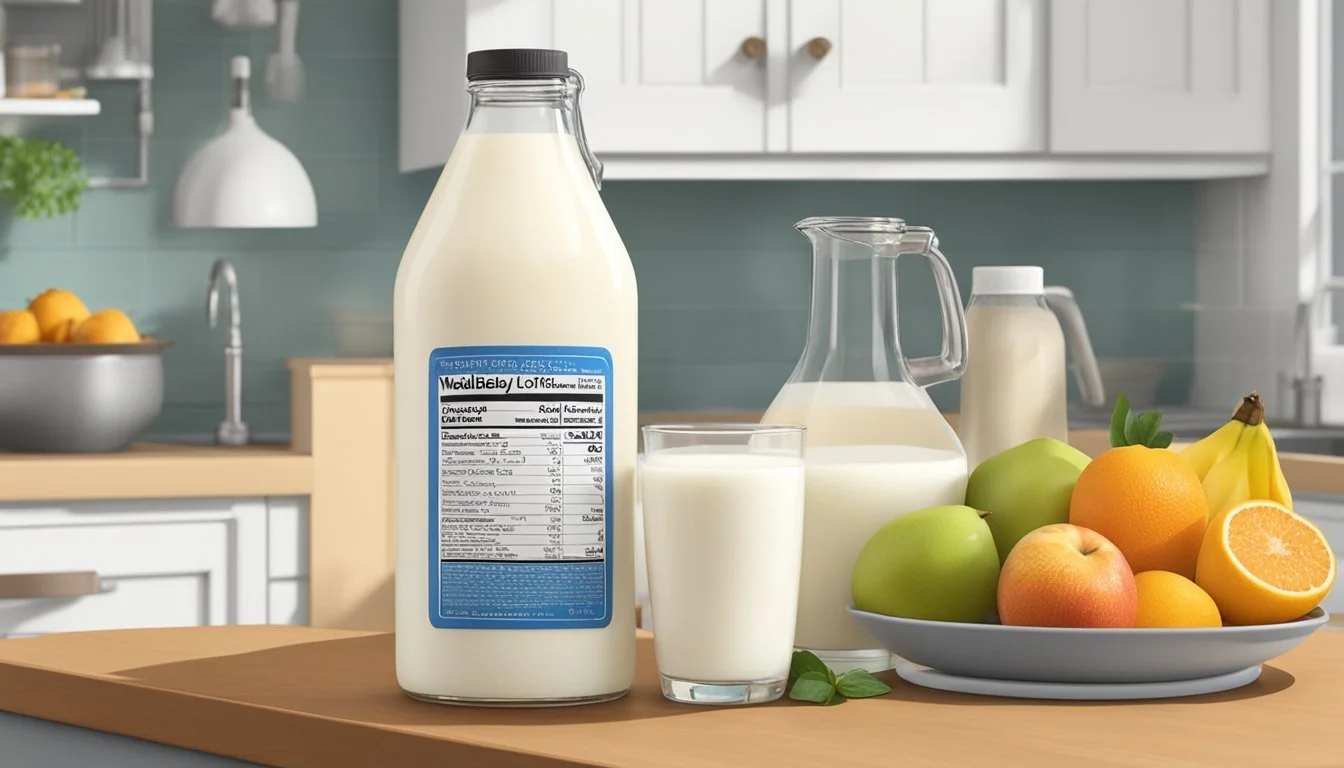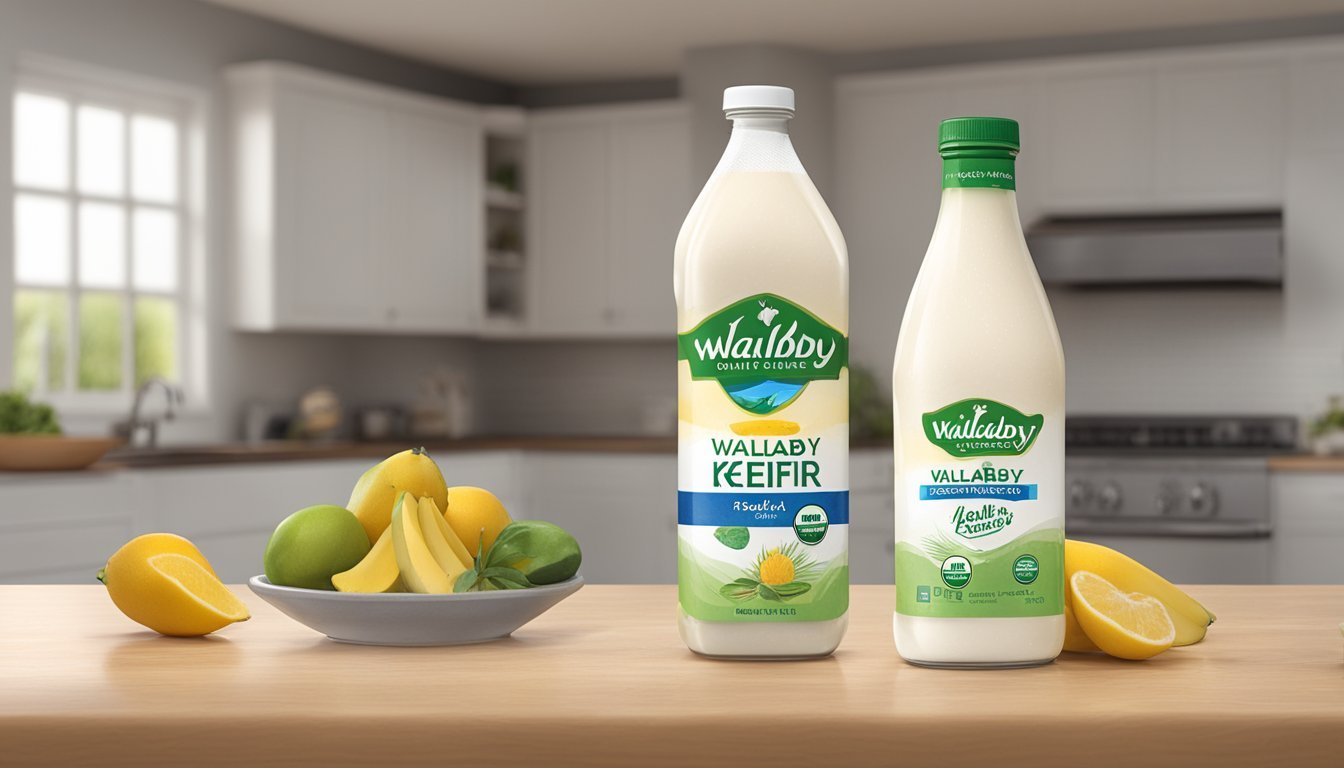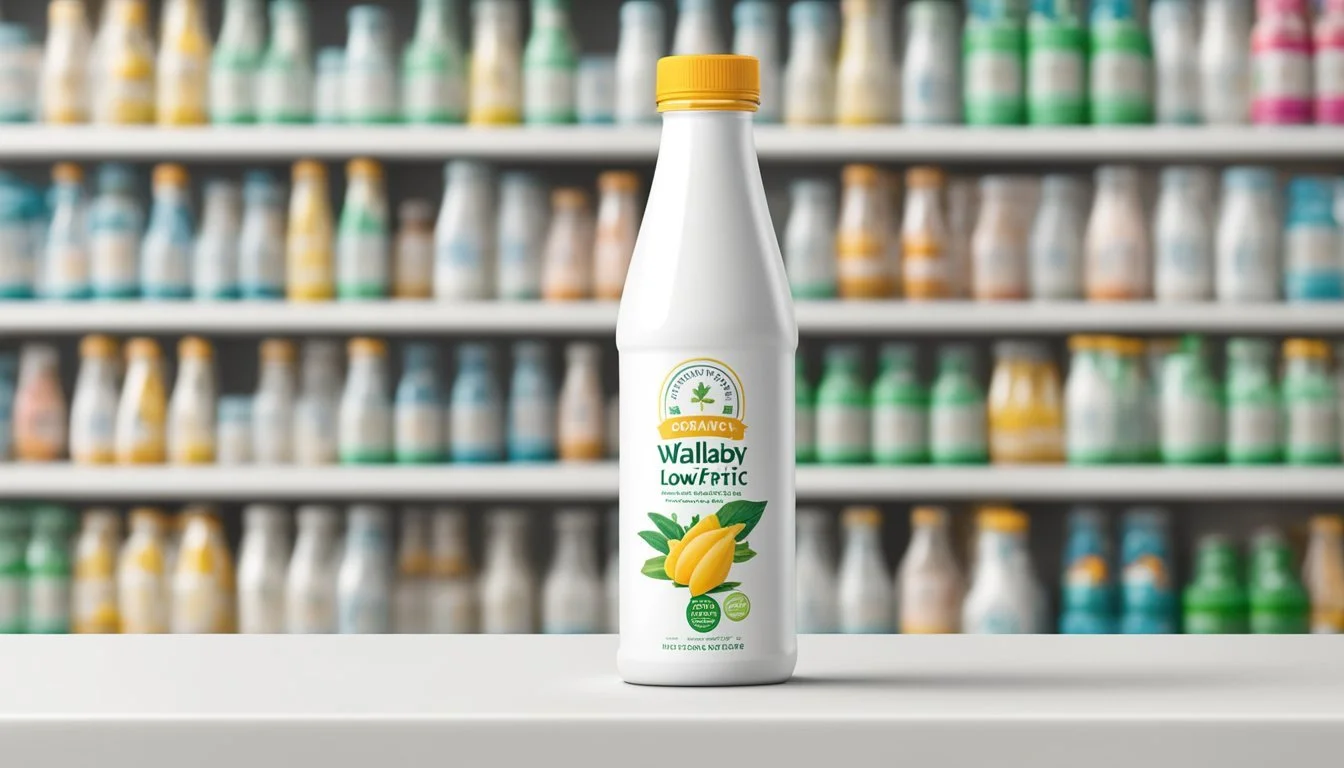How Long Does Wallaby Organic Lowfat Kefir Last?
Shelf Life and Storage Tips
Wallaby Organic Lowfat Kefir is a fermented dairy product that boasts an array of health benefits due to its rich probiotic content. The product longevity of this kefir goes beyond just an expiration date; it is influenced by the preservation of live and active cultures within the milk. As it sits on the shelf or in a refrigerator, the unique blend of 12 live and active cultures in Wallaby Organic Kefir continues to ferment the milk, which can impact its shelf life.
The shelf life of Wallaby Organic Lowfat Kefir is typically indicated by a sell-by date stamped on the packaging. While this date is a good indicator of the product's peak quality, the kefir can often be consumed beyond this date if it has been stored properly. Proper storage means keeping the kefir refrigerated consistently, as fluctuations in temperature can accelerate the fermentation process, potentially leading to a sour taste or spoilage sooner than expected.
It is important for consumers to understand the signs of spoilage, which include an off smell, a change in texture, or a distinctly sour taste. These indicators are more reliable than the sell-by date alone. Consumers who are aware of how to properly store and assess their Wallaby Organic Lowfat Kefir can enjoy it confidently and make the most of its probiotic benefits.
Understanding Kefir
Kefir is a probiotic-rich, fermented milk beverage with distinctive qualities that differentiate it from yogurt. Its unique fermentation process endows it with a diverse culture of bacteria and yeast.
What Is Kefir?
Kefir is a fermented drink typically made from cow's, goat's, or sheep's milk inoculated with kefir grains – a combination of yeast and bacteria. During fermentation, these microorganisms break down lactose in the milk, transforming it into a tangy, slightly carbonated beverage rich in probiotics. These live microorganisms contribute to gut health and offer various nutrients such as vitamins B and K, calcium, and protein.
Kefir Vs. Yogurt
While both kefir and yogurt are cultured dairy products that contain live probiotics, they have notable differences:
Consistency: Kefir typically has a thinner, drinkable consistency as compared to yogurt's thicker texture.
Feature Kefir Yogurt Texture Thinner, drinkable Thicker, spoonable Probiotic Strains Multiple strains of bacteria & yeast Usually fewer strains, mostly bacteria Fermentation 12-24 hours, kefir grains Several hours, specific cultures Lactose Content Lower due to more complete fermentation Higher, though often tolerable Taste Tart and tangy Mild and creamy
Probiotic Variety: Kefir contains a broader array of probiotics, including beneficial yeasts not found in yogurt.
Lactose: Because kefir is more thoroughly fermented, fermented milk drink generally contains less lactose than yogurt, making it easier to digest for those who are lactose intolerant.
Understanding these differences helps consumers make informed decisions based on their dietary needs and preferences. Kefir serves as an excellent choice for those seeking a probiotic-rich, nutrient-dense fermented drink with versatility in consumption methods.
Health Benefits of Kefir
Kefir offers a diverse range of health benefits, mostly due to its rich nutritional content and its ability to promote digestive health and bone strength.
Nutritional Content
Kefir is a fermented milk beverage that boasts a considerable nutritional profile. A serving typically contains:
Protein: Around 9 grams, which is essential for muscle repair and growth.
Calcium: Constitutes about 24% of the daily value (DV), supporting bone health.
Vitamin B12: Nearly 29% of the DV, aiding in red blood cell formation and neurological function.
Riboflavin (B2): Around 25% of the DV, crucial for energy metabolism.
Magnesium: About 7% of the DV, involved in numerous biochemical reactions.
Vitamin D: Provides about 12% of the DV, which is important for immune function and bone health.
Cholesterol & Sugars: It typically has lower levels of cholesterol and sugars compared to regular milk.
Iron & Vitamin A: Presence may vary depending on fortification and milk source.
Digestive Health
Kefir contains probiotics, which are beneficial bacteria that promote a healthy balance of flora in the gut. They can:
Help maintain a healthy digestive system.
Potentially alleviate symptoms of gastrointestinal disorders such as bloating, constipation, and diarrhea.
Bone Strength
The nutrients found in kefir are vital for bone health:
Calcium & Vitamin D: Work synergistically to maintain bone density and prevent osteoporosis.
Vitamin K2: Often present in fermented foods like kefir, is important for bone mineralization and helps to prevent bone fractures.
Wallaby Organic Kefir
Wallaby Organic Lowfat Kefir is a fermented milk drink known for its creamy texture and probiotic content. It is produced in California, emphasizing organic ingredients and a distinct culturing process.
Origin and Brand
Wallaby is an American brand that draws inspiration from Australian-style yogurt and kefir. The company's Organic Kefir is handcrafted in small batches in California. Using a slow culturing process, Wallaby creates a product with a remarkably smooth texture and mild taste.
Location of Production: California, USA
Inspiration: Australian-style dairy products
Organic Certification
The brand's commitment to quality is reflected in its USDA Organic certification. This certifies that Wallaby Organic Kefir:
Is made with organic milk from local farms adhering to federal guidelines.
Does not contain any artificial preservatives or additives.
Certification: USDA Organic
Certified by: Quality Assurance International
To carry the USDA Organic seal, the ingredients and production methods must meet stringent standards, ensuring the kefir is produced in an environmentally friendly and sustainable way.
Kefir Varieties
Wallaby Organic Lowfat Kefir comes in multiple flavor options and fat content levels, catering to diverse tastes and dietary preferences. Its texture ranges from creamy to smooth, influenced by the kefir cultures and milk used.
Flavor Options
Wallaby Organic Lowfat Kefir is available in several distinct flavors:
Plain: A versatile choice for those who prefer a natural taste.
Strawberry: Infused with real strawberry, it offers a fruity twist.
Vanilla: With a hint of vanilla, it provides a subtly sweet flavor.
Blueberry: (not listed in the entities but mentioned in the search results) This option includes blueberry for a refreshing taste.
Each flavor retains the signature smooth texture and can be enjoyed as a beverage or blended into smoothies.
Fat Content
Wallaby Organic offers kefir primarily in a lowfat option. The kefir is made with:
Organic Cultured Pasteurized Lowfat Milk: This base ensures a lower fat content while maintaining a creamy consistency.
Consumers who are mindful of their fat intake can enjoy Wallaby Organic Lowfat Kefir as part of a balanced diet.
Preservation and Shelf Life
When considering Wallaby Organic Lowfat Kefir, understanding its preservation and shelf life is crucial for maintaining both its quality and safety.
Proper Storage
Wallaby Organic Lowfat Kefir should be stored in the refrigerator at or below 40°F (4°C). The product is pasteurized, which helps eliminate harmful bacteria, but consistent, cool temperatures are essential to prevent spoilage and extend shelf life. Once opened, the Kefir should be kept sealed.
Expiration and Safety
An unopened bottle of Wallaby Organic Lowfat Kefir generally remains fit for consumption until the printed expiration date, which typically extends a few weeks post-purchase. Post-opening, one should aim to consume the Kefir within one to two weeks. If one notices a sour smell beyond the tangy scent typical of Kefir or any signs of mold, they should discard the product.
Extending Shelf Life
Freezing is not recommended for Wallaby Organic Lowfat Kefir as it can disrupt the texture and viability of probiotics. To maximize shelf life, one should adhere to proper storage procedures and handle the Kefir with clean utensils to prevent contamination.
Usage and Consumption
When consuming Wallaby Organic Lowfat Kefir, customers should be aware of how much to include in their daily diet and the various culinary contexts it can be used in.
Daily Intake Recommendations
The daily intake of kefir should align with overall dietary needs and calorie intake. Consuming one to two servings (1 serving = 1 cup or 8 ounces) of Wallaby Organic Lowfat Kefir can contribute to the recommended dairy intake for adults. Kefir's probiotic content supports digestive health, and one serving typically contains about 110 calories, making it a suitable option for a balanced diet.
As with any food, it's important not to overconsume kefir, as it does contain some sugar (though less than sweetened yogurts), and the calorie content should be factored into one's total daily caloric intake. Moderation is key.
Culinary Uses
Wallaby Organic Lowfat Kefir offers broad culinary versatility. Here are some specific ways it can be used:
As a Beverage: Kefir can simply be enjoyed as a smooth, tangy beverage. It can be an alternative to buttermilk or sweet drinks when a less sugary option is desirable.
With Breakfast: It pairs well with granola or can be poured over fruit.
In Smoothies: Kefir can be used as a substitute for yogurt or milk in smoothies, providing a probiotic boost.
In Baking: Due to its consistency and acidity, kefir can be used as a substitute for buttermilk or yogurt in baking recipes, providing a lighter texture to pancakes and waffles.
Marinades: Its acidic nature helps tenderize meats and adds a unique flavor when used as a marinade.
Customers should keep in mind that heating kefir can reduce the benefits of live cultures. Therefore, it is often best used in its raw form or added to dishes after they have been cooked.
Dietary Considerations
When selecting Wallaby Organic Lowfat Kefir, consumers should consider the potential presence of allergens and the lactose content in the product. These factors can influence dietary choices, particularly for individuals with sensitivities or dietary restrictions.
Allergens and Sensitivities
Wallaby Organic Lowfat Kefir is a dairy-based product, which makes it a potential allergen for individuals with dairy allergies. It is important to note that kefir grains, used to culture kefir, are typically gluten-free. However, those with severe sensitivities should always double-check the labeling for cross-contamination risks. Wallaby Organic specifies that their kefir is gluten-free, catering to those with gluten intolerances. The product does not contain soy, making it suitable for individuals with soy allergies.
Lactose Content
While kefir is a milk product, the fermentation process significantly reduces the lactose content, making it easier to digest for individuals who are lactose intolerant. The live cultures present in kefir can help with the digestion of lactose. Wallaby Organic Lowfat Kefir's fermentation process might make it a viable option for those with mild to moderate lactose sensitivities. However, those with severe lactose intolerance should still approach with caution and may need to consult a healthcare provider.
Shopping for Kefir
When purchasing kefir, consumers should consider both the cost and availability. Price can vary depending on brand and quality, while the choice of brands may be influenced by regional distribution and product type, such as low-fat or whole milk kefir.
Price Factors
The price of kefir is influenced by several factors:
Brand: Premium brands like Wallaby Organic may command higher prices due to their organic certification.
Size: Larger containers, typically 32 fl oz, may offer better value per ounce compared to smaller sizes.
Type: Varieties like lowfat and whole milk kefir can affect price, with some brands charging more for whole milk versions due to higher fat content.
Organic Certification: Organic products often cost more due to more stringent farming and production practices.
Availability and Brands
Kefir is available at many grocery stores, health food stores, and online retailers. The availability of different brands, including those that offer Aussie-style kefir, varies by location. Some popular kefir brands include:
Wallaby Organic: Known for their Australian-inspired yogurts and kefirs, they offer an organic lowfat milk kefir in 32 fl oz containers.
Other notable brands: Consumers may find brands like Lifeway Kefir, which are known for their wide range of flavored kefirs and wide availability.
When shopping, it is important to check the label for product specifications, including milk type (lowfat or whole milk) and size to ensure the product meets personal preferences and dietary requirements.
Special Occasions
When celebrating special events, unique and cultured foods such as Wallaby Organic Lowfat Kefir can play a central role in the dining experience. It's important to consider the beverage’s shelf-life to ensure peak freshness during these times.
Kefir in Celebrations
During occasions like Easter, Wallaby Organic Lowfat Kefir can be a nutritious addition to the feast. Typically, such dairy products maintain their quality for about two to three weeks past the printed date if kept refrigerated. For a festive twist, one might incorporate seasonal fruit like strawberries or blueberries. Utilizing natural sweeteners such as honey or agave can enhance the Kefir's mild taste without overpowering its inherent tanginess.
To highlight the live and active cultures in Kefir, it can be presented as a health-conscious choice for guests. These probiotics are beneficial for digestion and are a conversational point about the benefits of fermented foods. Serving Kefir as a creamy base for smoothies or a dressing for fruit salads can showcase its versatility in holiday menus.









